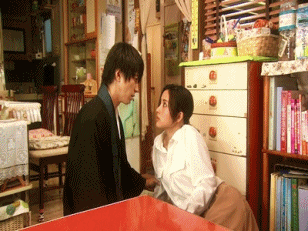|
|
楼主 |
发表于 2015-6-22 10:36
|
显示全部楼层
http://fourthreefilm.com/2015/06/haemoo/
Haemoo
BY CONOR BATEMAN · JUNE 5, 2015
Haemoo
Recommended
Shim Sung-bo’s debut feature film is utterly brutal, both to its characters and its audience. Adapted from a stage play by Sung-bo and his Memories of Murder director Bong Joon-ho, which in turn is loosely based on a real life event, Haemoo is a slow-burning act of misdirection, jolted to life and completely rendered anew about halfway through its runtime. It’s a film about desperation amidst tragic circumstances, a tale of survival that emerges from melodrama to reveal that what was initially a simple (if staid) drama about human generosity (or lack thereof) is now a tense and thematically complex look at self-interest prevailing over all.
The year is 1998; the Junjin, a creaky and rusted fishing trawler, is on the verge of being sold to the government for some compensation following the IMF crisis of 1997. The ship’s captain, Kang (Kim Yun-Seok), is disillusioned and complacent; our first glance at his on-shore life is a bleak one, he asks the Junjin’s owner for some money to “feed the crew”, only to give it to his wife as proof of his work and to supplement their income from the restaurant she runs on the harbour. Exacerbating the issue is that his wife has both mortgaged the restaurant and let it go to ruin, whilst also sleeping with other men in the kitchen. Captain Kang’s response is to buy the Junjin off of its owner, and after a bank rejects his loan application he goes to a local smuggler, who offers to pay him a significant amount of money to smuggle Chinese-Koreans immigrants into the country.
Kang fleeing from the reality of his circumstances isn’t unique on the Junjin; the engineer is on the run from debt collectors, the first mate (referred to as “boss’un”) finds solace only in a clear power structure, the deckhand and his younger assistant are both sex-obsessed, and the newest recruit, Dong-Sik (a brave and unusual debut role for K-Pop star Park Yoo-chun) naively believes working on a fishing trawler makes him a real man. All of these insecurities come to a head once the smuggled passengers arrive on the boat; Dong-Sik falls for a young woman whose life he saves, the deckhands try to coerce a woman to have sex with them for a better place to sleep on the ship, and the first mate struggles to hold control over the immigrants on-board. Following the sudden arrival of a marine policeman (a cameo by Yoon Je-Moon of Joon-ho’s Mother and The Host), the smuggling mission takes a decidedly different turn and Haemoo becomes a decidedly different film.
Like Jung Yoon-suk’s recent biting documentary Non-Fiction Diary (and, for that matter, Memories of Murder), Haemoo also applies a dark wit to a tragic true story in recent Korean history, though where Yoon-suk used distance in editing and juxtaposition, Sung-bo suddenly drops us into the middle of an increasingly volatile situation, jettisoning any commentary on the ethics of people smuggling. Hong Gyeong-Pyo’s cinematography shifts as well, from the surprisingly strong bursts of colour in daylight scenes of the first half to a murky gloom as the sea fog of the title (“haemoo” literally means sea fog) sweeps in, the dimly lit rooms of the ship adding to this claustrophobic feeling. The film’s score is in on the deception as well, Jeong Jae-il’s swirling piano ballad neatly aligning with the melodramatic romance at the film’s center, then when everything begins to unravel its unwavering presence, now the melody transplanted to strings, creates a disturbing tonal dissonance. The music becomes tense and adventurous whilst the movie circles inward, each character’s actions an extension of their initial desperation.
The film’s structure and subtext are its greatest virtues; as the narrative becomes progressively bleaker, its notion of male sexual frustration bubbles up from a running gag to motive for lethal action. This is what stays with the viewer moreso than the Lord of the Flies-esque savagery that comes with the fog, and the film’s end is a pointed message to that effect. Shim Sung-bo, with his first feature as director, has made a bold and vicious thriller masquerading as a drama and throws expected narrative convention out the window; it’s a bracing cinematic experience and one of the best surprises of Sydney Film Festival so far. |
|


































